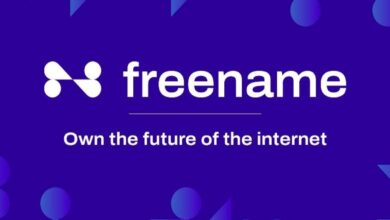Blockchain: A transformative technology underpinning the future in 2023

Blockchain has emerged as one of the most groundbreaking technologies of our time, captivating the attention of individuals, businesses, and governments worldwide. Its decentralized and transparent nature has the potential to revolutionize various industries, fostering trust, security, and efficiency in a multitude of transactions.
Table of Contents
At its core, blockchain is a distributed ledger that records transactions across many computers so that the record cannot be altered retroactively without the alteration of all subsequent blocks and the collusion of the network. This tamper-proof nature makes blockchain ideal for storing and managing sensitive data, such as financial records, medical information, and intellectual property.
The most well-known application of blockchain is cryptocurrency, such as Bitcoin and Ethereum. However, the potential of blockchain extends far beyond digital currencies. Some of the key applications of blockchain include:
Supply Chain Management:
Blockchain can be used to track the movement of goods and materials throughout a supply chain, ensuring transparency and traceability. This can help to reduce fraud and improve efficiency.
Financial Services:
Blockchain can be used to streamline and secure financial transactions, such as payments, settlements, and trade finance. This can lead to reduced costs and faster processing times.
Healthcare:
Blockchain technology, once synonymous with cryptocurrencies, has found a groundbreaking application in the realm of healthcare. In recent years, the healthcare industry has witnessed a paradigm shift, with blockchain emerging as a transformative force. At its core, blockchain is a decentralized and secure digital ledger that records transactions across multiple computers, ensuring transparency and immutability of data.
In healthcare, this technology plays a pivotal role in enhancing data security, interoperability, and patient privacy. Electronic health records (EHRs) stored on blockchain platforms are encrypted, safeguarding sensitive patient information from unauthorized access. Moreover, the decentralized nature of blockchain allows seamless sharing of patient data among healthcare providers, promoting interoperability and improving the quality of care.
Smart contracts, a feature of blockchain, automate and enforce the terms of agreements, streamlining administrative processes and reducing fraud. Additionally, blockchain enables the tracking and authentication of pharmaceuticals throughout the supply chain, mitigating the risk of counterfeit drugs.
The utilization of blockchain in healthcare signifies a significant step toward a more efficient, secure, and patient-centric industry. As the technology continues to evolve, its potential to revolutionize healthcare processes and improve patient outcomes is boundless, ushering in a new era of innovation and reliability in the healthcare sector.
Voting:
Blockchain technology has ushered in a new era of secure and transparent voting systems, transforming the way we conduct elections. The role of blockchain in voting processes is pivotal, ensuring the integrity and reliability of electoral systems. By utilizing blockchain, votes are securely recorded and stored in a decentralized digital ledger, making tampering virtually impossible.
One of the key advantages of blockchain in voting is its ability to enhance the trustworthiness of elections. Each vote cast is encrypted and time-stamped, creating an immutable record that can be verified by anyone, thus eliminating concerns about fraud or manipulation. Additionally, blockchain allows for real-time monitoring, providing instant updates on the voting process.
Moreover, blockchain-based voting systems enhance accessibility and inclusivity. Remote or physically challenged voters can participate seamlessly through secure online platforms, fostering a more democratic electoral process. Blockchain’s encryption ensures voter anonymity, safeguarding individual privacy while maintaining the integrity of the overall system.
As nations across the globe explore innovative ways to conduct secure elections, blockchain stands out as a reliable solution, ensuring fair, transparent, and tamper-proof voting processes. Embracing blockchain technology in voting not only revolutionizes democracy but also instills confidence in the electoral process, laying the foundation for a more accountable and participatory society.
Identity Management:
Blockchain technology has emerged as a game-changer in the realm of identity management, offering secure, efficient, and transparent solutions. In traditional identity systems, personal data is vulnerable to breaches and misuse. However, blockchain introduces a revolutionary approach by storing identity information in a decentralized, encrypted ledger.
The role of blockchain in identity management is to ensure the integrity and privacy of personal data. Each user has a unique cryptographic key, enhancing security and preventing unauthorized access. Moreover, the decentralized nature of blockchain means that individuals have control over their own data, deciding what information to share and with whom. This empowers users and eliminates the risk of centralized data breaches.
Blockchain also facilitates seamless and secure verification processes. Institutions can quickly and accurately validate identities without compromising sensitive information. Smart contracts enable automatic verification, reducing administrative overhead and enhancing efficiency.
Additionally, blockchain-driven identity management systems have immense potential in various sectors, including finance, healthcare, and government services. By embracing blockchain, organizations can establish trust, enhance security, and streamline identity verification processes, ultimately creating a safer digital environment for individuals and businesses alike. Embracing blockchain technology in identity management is not just a technological advancement; it’s a step towards a more secure and trustworthy digital future.
As blockchain technology continues to evolve, it is likely to have a profound impact on a wide range of industries and aspects of our lives. Its potential to foster trust, security, and efficiency is immense, and it is only a matter of time before blockchain becomes an integral part of our global infrastructure.
Conclusion:
Blockchain is a transformative technology with the potential to revolutionize the way we conduct transactions and manage data. Its decentralized and transparent nature makes it ideal for a wide range of applications, and it is likely to have a profound impact on our society in the years to come.
Frequently Asked Questions (FAQs)
Q1: What is Blockchain?
A1: Blockchain is a decentralized digital ledger technology that records transactions across multiple computers in a secure and transparent manner, ensuring integrity and preventing tampering.
Q2: How Does Blockchain Ensure Security?
A2: Blockchain ensures security through encryption, consensus algorithms, and decentralization. Each block of data is encrypted and linked to the previous one, creating a secure chain. Consensus mechanisms validate transactions, and decentralization prevents a single point of failure.
Q3: What Are Smart Contracts?
A3: Smart contracts are self-executing contracts with the terms of the agreement directly written into code. They automatically execute actions when predefined conditions are met, without the need for intermediaries.
Q4: Can Blockchain be Hacked?
A4: Blockchain technology is highly secure due to its cryptographic features and decentralized structure. While no system is entirely hack-proof, the decentralized nature of blockchain makes it significantly more resistant to hacking attempts.
Q5: Is Blockchain Limited to Cryptocurrencies?
A5: No, blockchain technology has diverse applications beyond cryptocurrencies. It is used in supply chain management, healthcare, voting systems, identity verification, and more, enhancing security and transparency in various industries.
Q6: What is Cryptocurrency Mining?
A6: Cryptocurrency mining is the process by which transactions are verified and added to the public ledger (the blockchain). Miners use powerful computers to solve complex mathematical puzzles, validate transactions, and secure the network in return for newly minted cryptocurrency coins.
Q7: How Does Blockchain Impact Data Privacy?
A7: Blockchain enhances data privacy by allowing individuals to have control over their own data. Personal information can be stored on the blockchain in an encrypted format, and users have the keys to access and share their data as needed, ensuring privacy and security.
Q8: What Are Public and Private Blockchains?
A8: Public blockchains are open to everyone and are maintained by a network of nodes distributed globally. Private blockchains, on the other hand, are restricted to specific users or organizations, providing more control over access and permissions.
Q9: Can Blockchain Transactions be Reversed?
A9: Once a transaction is added to the blockchain and confirmed by the network, it becomes permanent and cannot be reversed. This immutability ensures the integrity of the transaction history.
Q10: What is the Future Potential of Blockchain Technology?
A10: The future potential of blockchain technology is vast. It is expected to revolutionize various industries by enhancing efficiency, reducing costs, ensuring security, and enabling new business models, making it a fundamental technology for the digital age.
Related Article:
“Metaverse Concepts Unveiled: Exploring the Core Concepts of the Virtual Frontier in 2023”





